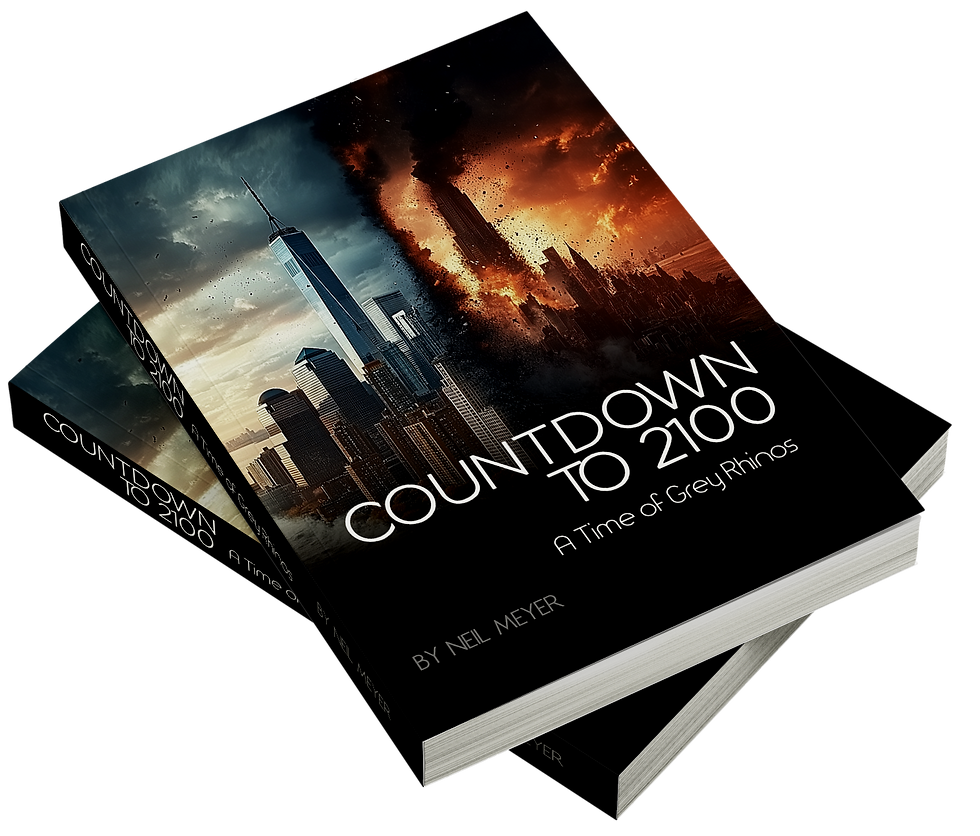Countdown to 2100
- Neil Meyer
- May 9, 2025
- 3 min read
Why review a book on day-one?
Because Countdown to 2100: A Time of Grey Rhinos lands squarely on the questions we’re hired to answer:
What systemic threats are accelerating, how do they collide with strategy, and what’s the responsible play when the long-term inevitably becomes the short-term?
Neil Meyer (yes, the same Neil who Founded Beyond Countdown) has released the full e-book free of charge — a useful gesture when the subject-matter is existential and the audience is everyone. The paperback is on Amazon, but the digital version is pay-wall-free so the conversation can start quickly.

What you’ll read (and why it matters)
Section | Business relevance (in one breath) |
The Grey Rhino Lens – predictable, high-impact risks we choose to ignore. | Re-frames “black swan” complacency and puts a probability score on tomorrow’s crises. |
AI & Post-Human Economics | Moves the automation debate from “job losses” to “who controls value when consumers disappear”. |
The Mutation of Capitalism | Charts the shift from middle-class consumption to enclave economics — a direct hit on demand forecasts and labour strategy. |
Climate & Ecosystem Collapse | Links supply-chain fragility, migration pressure and regulatory over-correction in language CFOs understand. |
Fractured Power & New Currencies (Water / Energy) | Explains why ESG is no longer reputation management but licence-to-operate. |
12 ‘What Can You Do About It?’ Chapters | Each ends with concise actions — the raw material for enterprise risk registers and board away-days. |
The narrative alternates between hard analysis and short fictional vignettes that follow ordinary people from 2030 to 2100. It’s a smart device: leaders feel abstract statistics, but they remember lived experience.
Tone check: not a doom scroll, not a sugar-high
The book is blunt (“hope is not a strategy; bullets are rarely dodged”) yet oddly energising. Think Ofsted report meets Black Mirror but with footnotes and no moral grand-standing. That balance resonates with senior teams who are tired of “either-or” futurology — apocalyptic hand-wringing or blind techno-optimism.
Why business readers should spend the train-ride
Board-room translation – complex macro forces rendered into board-pack English.
Scenario breadth – AI, climate, capital flows, social fracture … all in one model instead of five disconnected white-papers.
Action bias – every chapter closes with “What You Can Do Right Now” (a welcome pivot from horizon-2050 reports that finish with “more research is needed”).
Licence-free – cite, extract, share internally without wrangling legal; the author explicitly invites it.
A quick taste
“Capitalism isn’t dying – it’s mutating. A machine-tuned beast that no longer needs mass labour, nor mass consumption, to survive.”— Ch 2, ‘When Consumerism & Capitalism Eat Themselves’
That single paragraph has already sparked a healthy row in one client workshop: if the “consumer engine” is stalling, what happens to brands built on endless micro-upgrades? The book gives you a framing, the workshop gives you a roadmap.
Our verdict
For leaders in strategy, risk or sustainability who feel the weekly whiplash of AI hype, climate disclosure, social unrest and supply-chain spasms, Countdown to 2100 is a two-hour reality-check. It won’t give you comfortable answers; it will upgrade the questions you bring to the table.
Next step
Download the free e-book → https://www.neilsmeyer.com/countdown2100 and mark Chapter 1’s “What Can You Do About It?” list against your current risk register. If three or more items are missing, start a conversation with us.
Grey Rhinos rarely wait for perfect timing.




Comments